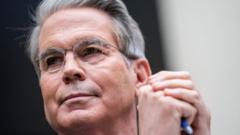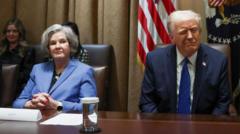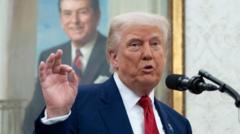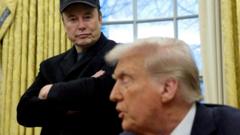As President Trump intensifies his confrontational stance against Harvard, experts warn of lasting repercussions for the landscape of American higher education, challenging traditional norms and stirring a conservative movement against elite institutions.**
The Broadening Impact of Trump's Assault on Higher Education**
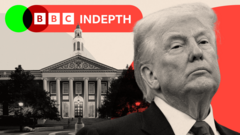
The Broadening Impact of Trump's Assault on Higher Education**
Trump's strategies against Harvard University represent a larger cultural and political battle affecting all U.S. universities.**
In a week that has seen U.S. President Donald Trump unleash a torrent of directives aimed squarely at Harvard University, the ramifications are echoing far beyond the Ivy League walls. Initiating with threats to withdraw $3 billion earmarked for Harvard's research programs in favor of vocational training, Trump’s administration quickly escalated efforts to reevaluate existing federal contracts. By Wednesday, he publicly admonished the university, claiming that "Harvard needs to behave" and asserting a connection to what he deems disrespect for the nation.
These actions represent a frontal assault on one of the most prestigious educational institutions in America, characterized by freezing grants and targeting foreign student admissions. Even if potential legal challenges roll back some of these measures, the cultural shift occurring within the broader academic landscape is unmistakable. Greg Wolfson, president of the American Association of University Professors, remarked that these actions, while specific to Harvard, could easily extend to any academic institution across the country.
Graduates at Harvard's recent commencement expressed palpable concern, recognizing the implications of these policies as indicative of a larger agenda. One graduate, fearing repercussions on his visa, noted the stark realization that what affects Harvard could spell trouble for all universities nationwide.
This conflict, sparked by various claims against Harvard—including a perceived lack of conservative representation among faculty and allegations of failing to combat antisemitism—underscores an intensifying conservative movement seeking to dismantle the historical support liberal institutions have provided to Democratic ideals. Following increased tensions surrounding antisemitism on campus, fueled by the recent Gaza conflict, Trump’s administration began to demand significant changes from Harvard. These included calls to end diversity programs, reform admissions policies, and closely scrutinize foreign students for beliefs deemed counter to American values.
Educators and policymakers are left grappling with the reality that Trump’s rapid and unyielding tactics aim to change not only Harvard but also the very essence of American higher education. Experts contend this represents a long-term campaign designed to overhaul elite universities with a more conservative framework. Alongside prominent institutions like Princeton and the University of Pennsylvania, universities nationwide face similar pressures, prompting investigations and funding cuts.
Critics argue that the recent aggressive stance targets what has long been viewed as liberal strongholds, directly challenging the ideological fabric woven through decades of higher education policy. Some conservatives, like Charlie Kirk of Turning Point USA, applaud these efforts, perceiving academia as a bastion of liberal indoctrination needing transformation.
The juxtaposition of public opinion reflects a divide between those with and without college degrees, further complicating the narrative surrounding education in America. While community sentiment often backs the institution, a notable faction aligns with Trump’s initiatives, highlighting a prominent ideological fracture.
As Harvard endeavors to combat this unprecedented pressure through judicial means—several lawsuits aimed at sustaining funding and academic integrity are already underway—questions about the future of U.S. education loom larger. Polls suggest a majority public favor supportive universities over Trump’s proposed cuts, yet the long-term viability of academic independence hangs in the balance.
Ultimately, the question remains if the system of higher education can rebound from these tumultuous times or if it reflects a more permanent shift catalyzed by political doctrine. The infiltration of partisanship into academic halls marks a transformative period, suggesting that regardless of rebellion against Trump's agenda, the sanctity of higher education will undeniably face newfound scrutiny.









